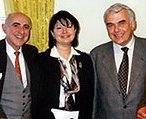The Abramoff scandal and Russian military intelligence

Press reports about the malfeasance of former Washington insider Jack Abramoff have missed an important dimension of the disgraced lobbyist's career.
Abramoff may have been a counterintelligence problem for the United States and for the decision-makers he targeted and funded.
His lawyer, Julius "Jay" Kaplan (at left of photo), jumped all over this blogger several years ago when I was researching a piece on Russian influence-peddling for a New York financial magazine. I was tracking down a Russian money trail around then-Vice President Al Gore and Deputy Secretary of State Strobe Talbott when I discovered that Abramoff was involved with at least one Russian GRU military intelligence figure whose company was paying him to organize congressional delegations to Moscow.
In April 2005 and again December 31, the Washington Post ran a photograph of one of the GRU figures, Marina Nevskaya, standing with Kaplan and others. (Click here for the photo. Nevskaya is in the middle. Kaplan is wearing the red tie.)
Nevskaya's company, NaftaSib, paid Abramoff to represent it in Washington. In some documents filed with the Clerk of the House, Abramoff masked the connection through a Bahamian cutout company, registering as an agent of the Bahamas and not of Russia.
NaftaSib's official biography of Nevskaya says she speaks fluent French and Vietnamese in addition to English, and that she was an instructor at the Military Diplomatic Academy in Moscow. Her biography does not say that the academy is a principal training school for Russia's GRU military intelligence service.
The GRU's continued offensive espionage operations against the United States, which the FBI says continue at Cold War levels, make Nevskaya's service as a GRU instructor important to the Abramoff influence operation.
Was the GRU using Abramoff to compromise Congress and other Washington policymakers for Russian military intelligence?
While researching the story in the summer of 1997, I posed the question to a senior FBI counterintelligence agent. He was hard-nosed Cold Warrior with a reputation of strong skepticism against the Russians. To my surprise he shrugged off the question, saying there was probably nothing to it. Two-and-a-half years later, in early 2000, I understood his disinterest when he himself was arrested as a Russian spy.
I don't think that Robert Hanssen had any inside information, and I'm not trying to connect him with Abramoff or Nevskaya. (Nor, for that matter, am I accusing Nevskaya or her company of anything beyond running influence operations in Washington.)
The financial magazine never ran the story, so I mentioned the connection in the Russia Reform Monitor newsletter in August, 1997. I had a dim view of Abramoff then, and was concerned that his paid work for the Russians would damage Republican congressional figures to whose causes Abramoff had been donating money. (Disclosure: I worked for Abramoff at the College Republican National Committee in 1982 and 1983, and quit with two colleagues after we suspected him of financial improprieties.)
Few noted the Abramoff-NaftaSib issue until 2004, when major news organizations started going after Abramoff's contacts in the House of Representatives.
The Washington Post and NBC know about the GRU issue, because they have quoted of late from my 1997 report, yet no one has raised the possible Russian spy connection. It's about time someone did.


3 Comments:
Hoping you're still reading your email.
I'd love to chat with you about the Naftasib connection - especially in light of everything happening recently.
qzz0621
cheap snapbacks
denver broncos jerseys
san antonio spurs jerseys
canada goose outlet
michael kors outlet
pandora charms
ubiq shoes
football shirts
jimmy choo shoes
ugg outlets
www0730
louboutin shoes
manolo blahnik
jordan 8
nfl jerseys
supreme shirt
coach outlet online
ugg boots
ralph lauren uk
longchamp bags
pandora jewelry outlet
Post a Comment
<< Home